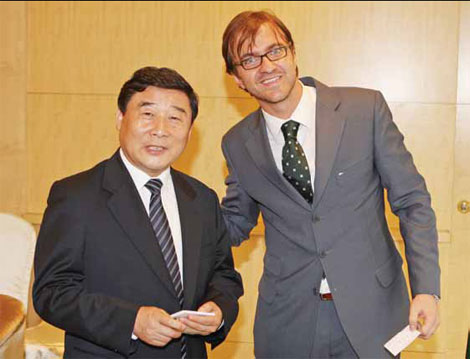A taste of Europe in Nanjing
Updated: 2012-05-11 07:50
By Xie Yu and Song Wenwei (China Daily)
|
||||||||
|
Carlo D'Andrea of the Picozzi & Morigi Law Firm, with Zhang Jisheng, deputy secretary general of the Jiangsu provincial government. Provided to China Daily |
City proving to be major magnet for investment from Italy
More than 400 years ago, Italian Jesuit missionary Matteo Ricci spent some time in an eastern Chinese city called Nanjing, which he described as the "most beautiful and grand city in China".
Little did Ricci, one of the first Westerners to adapt to Chinese customs during his long sojourn in the Middle Kingdom, realize that his journey would prove to be the inspiration for legal expert Carlo D'Andrea many years later.
D'Andrea, the managing partner of Greater China at Picozzi & Morigi Law Firm, came to China and more importantly Nanjing out of curiosity, but stayed on for the love of the city.
"I think Nanjing is a huge city looking to the future, but with its roots still deeply embedded in the past," he says.
D'Andrea says that the ancient city walls dating back to the Ming Dynasty (1368-1644) and the beautiful lakes and mountains that dot the city all give a wonderful feeling of an ancient era.
At the same time the glitzy shopping malls, Western restaurants and international schools are modern day attractions in Nanjing that are designed to make life for expats rosy and comfortable.
"It is a city full of surprises, and you will see changes every week," he says, noting that when he first came to Nanjing six years ago, it took him six hours by train to reach Shanghai. It was also a time when a Western traveler was a rarity on the trains.
But all of that has changed. The high-speed railway, which connects Nanjing to Shanghai, makes the same journey in less than one and a half hours now and it is not so uncommon to see several foreign travelers on the trains.
"Life here is totally different from what it used to be in Rome, where nothing changes and everything is more or less the same. But in Nanjing, you feel every day is a new experience. On the days that I do not work, I enjoy walking in the market and talking to people. They are so nice and polite," he says.
D'Andrea says that in 2005 he got a job offer which entailed working in China or India.
"China was my obvious choice as I was always fascinated by the products that had the 'made in China' tag. The added attraction was to see the beauty and splendor of the land so lovingly described in Matteo Ricci's books."
Arriving in Nanjing, D'Andrea decided that his first task was to learn the language much like his predecessor did some 400 years ago. He studied Chinese language at the Nanjing Normal University along with his work at an Italian law firm.
"Part of this (learning Chinese) was also necessitated by the fact that Nanjing is not exactly the destination of choice for international firms. So to work and live here, it was important to be equipped with the local language," he says.
Italian companies were the first international firms to descend on Nanjing, especially automobile majors like Fiat and Iveco. With more Italian companies moving to China, D'Andrea says it is a busy time for his firm as they now have several Chinese and European clients.
Barring actual courtroom appearances, that are not permitted under Chinese laws, D'Andrea and his colleagues provide comprehensive services like legal advice to foreign clients about their business in the Chinese market, investing in China, mergers and acquisitions, commercial contracts, labor laws, intellectual property protection and dispute resolution, as well as suggestions for opening companies in Europe for their Chinese clients.
Picozzi & Morigi also plans to set up offices in Zhuhai, Guangdong province and Chengdu, Sichuan province, with Nanjing being the headquarters.
Among the cities that make up the Yangtze River Delta region, an economic engine of China, Nanjing is not the leader. Shanghai had the advantage of opening-up early and a good coastal location.
When Shanghai became expensive, foreign investment flowed to other mearby cities like Suzhou, a historic city in Jiangsu province.
But D'Andrea believes Nanjing has its own advantage and specialty that can draw more foreign investment.
"Unlike Shanghai and Suzhou, there is more land available in Nanjing. It also has a big international airport, and provides easy access to big markets in central China. It is also well connected to most of the places in China, including the western region," he says.
Contact the writers through xieyu@chinadaily.com.cn
(China Daily 05/11/2012 page15)

 Relief reaches isolated village
Relief reaches isolated village
 Rainfall poses new threats to quake-hit region
Rainfall poses new threats to quake-hit region
 Funerals begin for Boston bombing victims
Funerals begin for Boston bombing victims
 Quake takeaway from China's Air Force
Quake takeaway from China's Air Force
 Obama celebrates young inventors at science fair
Obama celebrates young inventors at science fair
 Earth Day marked around the world
Earth Day marked around the world
 Volunteer team helping students find sense of normalcy
Volunteer team helping students find sense of normalcy
 Ethnic groups quick to join rescue efforts
Ethnic groups quick to join rescue efforts
Most Viewed
Editor's Picks

|

|

|

|

|

|
Today's Top News
Chinese fleet drives out Japan's boats from Diaoyu
Health new priority for quake zone
Inspired by Guan, more Chinese pick up golf
Russia criticizes US reports on human rights
China, ROK criticize visits to shrine
Sino-US shared interests emphasized
China 'aims to share its dream with world'
Chinese president appoints 5 new ambassadors
US Weekly

|

|








